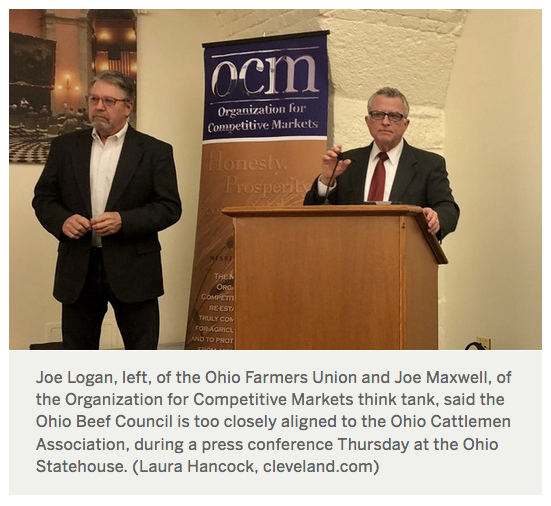Cleveland.com: Family farmers question how they’re taxed
By Laura Hancock | lhancock@cleveland.com
COLUMBUS, Ohio – Ohio family farmers are questioning how a beef tax that is supposed to promote the industry is being used.
The questions come amid allegations that the organization that receives the tax money is connected to large, multi-national corporate producers.
When a head of cattle is sold in Ohio, farmers pay $2 into the Beef Checkoff Program, Capitol Letter, cleveland.com’s daily Statehouse briefing, reported Friday morning. Fifty cents goes to the federal government, and the remaining tax money goes to the Ohio Beef Council, which is supposed to use the money to promote beef and research new uses for the commodity, said Joe Logan of the Ohio Farmers Union at a Thursday news conference.
Logan said the tax in the past launched the widely known “Beef – It’s What’s for Dinner” media campaign.
But a new report from the Nebraska-based think tank Organization for Competitive Markets, which also had representatives at the news conference, concluded that the organization that receives the Beef Checkoff money, the Ohio Beef Council, is in the same Marysville building as the Ohio Cattlemen’s Association. The seven Cattlemen’s Association staff members are also listed with the same job titles on the Beef Council’s website.
Maxwell said the Cattlemen’s Association represents heavyweights in the beef industry, such as JBS Swift of Brazil and Smithfield Foods of China, and may not be using the tax to help local family farmers.
There has been no state audit to shed light on how the money – roughly $800,000 a year – is spent, Maxwell said.
Mark Bruce, a spokesman for the Department of Agriculture, said the state agency oversees the Beef Council, and receives the council’s third-party audits, which it will share with anyone who asks.
Capitol Letter received an April 4 audit of the Beef Council’s previous two years by Holbrook and Manter CPAs. Cash flow was properly recorded and it fairly presented the Beef Council’s financial position, the auditors found. While expenditures showed that money had been used on merchandise and printing and publishing, specific details were not included.
The Department of Agriculture also allows farmers to request that their tax money is refunded – although Maxwell said the refund process is burdensome.
The Farmers Union asked the Ohio Auditor’s office to look at the Beef Council in 2016, but the office cannot audit the group because of federal regulations and because its expenses are audited by an independent accountant, said Beth Gianforcaro, an auditor’s spokeswoman.
The Ohio Beef Council defended itself against the allegations, saying it is has independence from the Cattlemen’s Association, with a firewall that separates the two entities. There is a 15-member operating committee over the Beef Council, appointed by the Ohio Department of Agriculture director, and members “take their responsibility for investing producer funds to enhance beef demand very seriously,” said Jamie Graham, the council’s chairman and a cattleman from Southeast Ohio.
Small family farmers and corporate farms have sometimes been on the opposite sides of agricultural policy discussions in Washington and Columbus, Maxwell said.
Cattlemen lobbyists have fought government attempts to mandate that beef be labeled with the country of origin, Maxwell said. That’s in opposition to many Ohio family farmers, who want labels – believing U.S. consumers would more likely purchase steak produced domestically, which will boost sales, he said.
“This is why young people don’t want to return to the farm,” said Angela Huffman, spokeswoman for the Organization for Competitive Markets. “The deck is stacked against us.”
